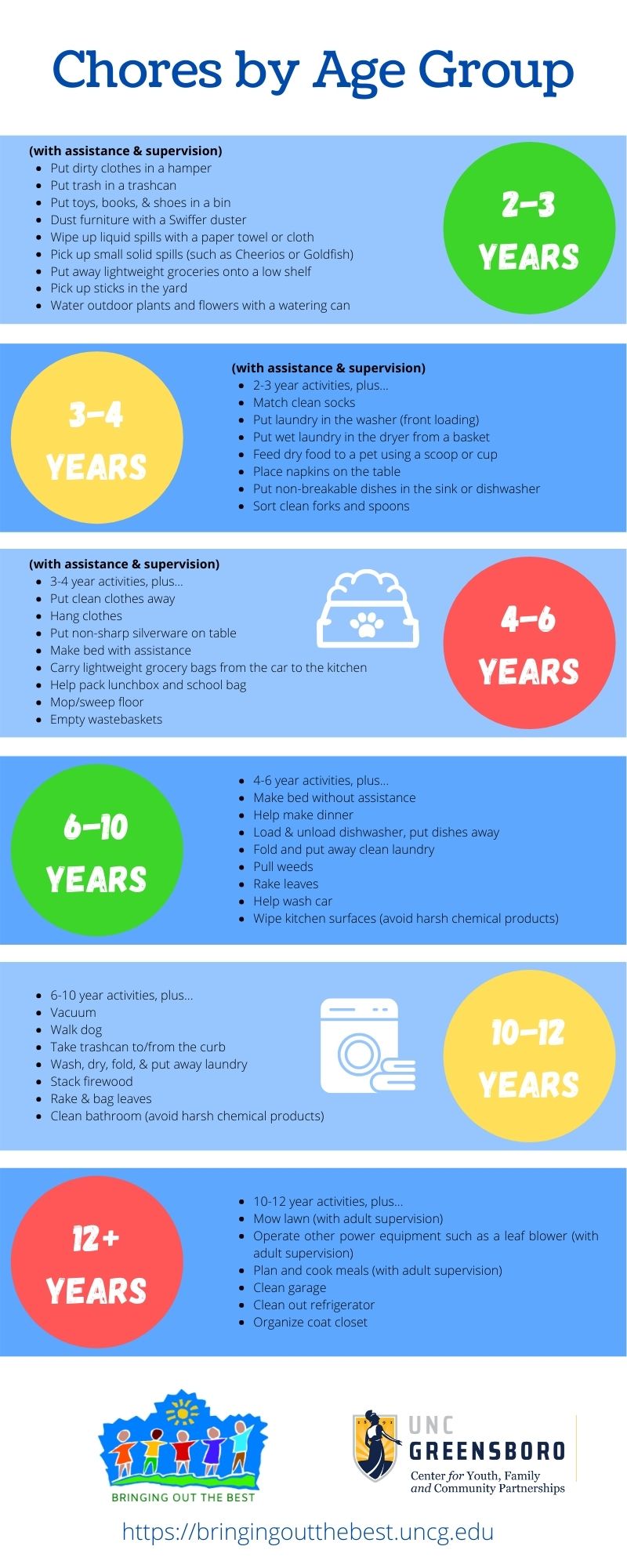Tips for getting Kids to Help with Chores
Just the thought of chores makes me want to roll my eyes, grumble, and hide in my room, and I’m an adult! So, it’s no wonder our children dread household chores and often rebel when the subject comes up. The funny thing is…I have spent countless hours in preschool classrooms as a teacher and a behavior specialist and I can tell you without a doubt that children thrive on responsibilities in school. They often argue over who gets to help the teacher lay out the cots or pass out the napkins. So why is it such a struggle to get kids to help with chores at home?
Maybe it’s your presentation…
The goal of chores isn’t to lighten your workload as a parent (although it can be a nice perk), but rather to teach responsibility and instill good habits. Through chores, children learn that it takes the commitment of all family members to run a household. Setting a foundation of working together has long term benefits for children as they grow more helpful and independent.
Here are a few tips to help you gain compliance from your kids and get the job done:
1. What is realistic to expect my child to do? Young children must have a clear understanding of what is expected of them. They will need assistance and modeling as they are learning a new skill. When you say “clean up your toys,” a young child will become overwhelmed and either shut down or melt down. Instead, try saying, ”This looks like a big job. I can help you. I’ll put all the red Legos in the basket. What color would you like to pick up?” In this scenario, the task is broken into smaller (more manageable) steps, the child is given some control over the color of Legos she chooses, and the task is more fun and interesting when you create a “game” out of it.
2. How many chores should children take on? It’s best to stick to just a few tasks at first. Consider whether the task is daily (feeding the cat), weekly (taking the trash can to the curb), or less frequent (picking up sticks in the yard). Older children will be able to handle more tasks with greater independence and accuracy. Keep in mind, the goal of chores is to teach responsibility and instill good habits. Eventually, chores like putting your clothes in the hamper will become a habit. That’s the idea, anyway!
3. Is it possible to make chores more fun (or at least less dreadful) for my child? Children resist chores because they are routine and boring. Get creative…”Let’s see who can pick up the most doll clothes…On you mark, get set, GO!” Have a race between siblings or parents, or set a sand timer and have your children finish picking up the toys before all the sand goes to the bottom. Try playing your favorite song and singing and dancing while you mop the floor. Other creative ideas are playing hamper basketball, or walking each dinosaur over to the container for “dinosaur bedtime.”
4. Should I reward my child for completing chores? Rewards can be effective in motivating behavior, but parents should think carefully about whether to offer their children prizes or money for completing chores, since the end goal is to help children learn that all family members are expected to contribute in helpful ways as part of a family unit. Here is the exception…Older children may have the opportunity to earn money for special projects and activities like babysitting younger siblings, organizing the pantry, or laying mulch, which also can be an opportunity to help them learn money management skills. The most powerful reward is positive, descriptive praise! It can look like this: “You packed your lunch box all by yourself. You are really growing up;” or “Thanks for pulling the trash can in without me asking.”
5. Let go of perfection. If you expect children to perform chores with the same precision you expect from yourself, you will only discourage them. Praise participation, not perfection! If your child makes his bed by himself and the bedspread is crooked and wrinkled, don’t go behind him and fix it. If you do, all your child will learn is that you can do it better. Instead, praise the progress they’re making: ”You are getting really good at making your bed. I can tell you worked hard on this!”
Check out the infographic below to find suggestions for age-appropriate chores.

By Leslie Alexander, Assistant Director, UNCG’s Bringing Out the Best program
Want to see more blogs like this and get notifications on local events in the Triad? Subscribe to TMoM’s free weekly newsletters.
If you like this blog on Tips for Getting Kids to Help with Chores you might also like these:
7 Easy Chores Your Kiddo Can Master Today
Divide and Conquer the Household Chores
Finding Balance as Parents: Chores, Marriage, Childcare, and More
